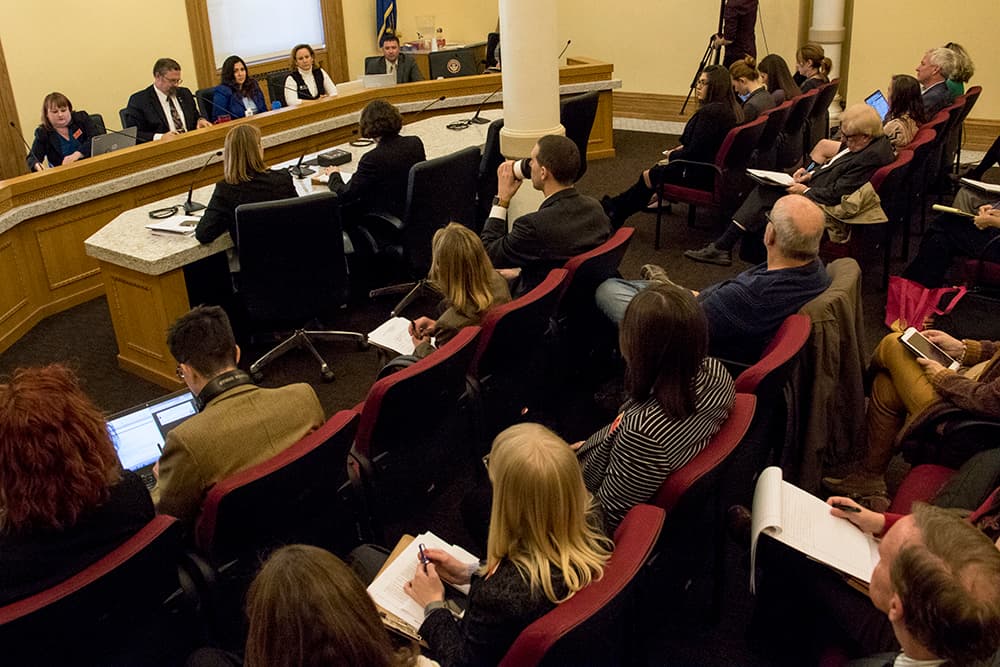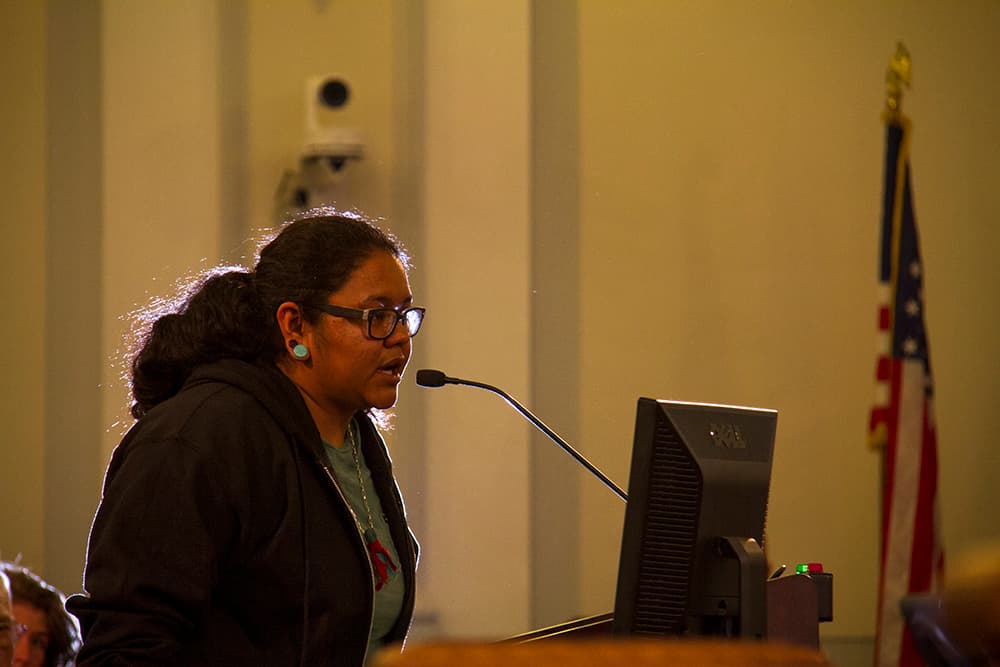
The policies adopted by the New York Assembly after a major sexual harassment scandal haven't eradicated the problems there, but there's been some important changes. Complaints that used to go the speaker of the assembly now go to an independent investigator who has the power to interview any and all witnesses and review all communications, including emails and text messages.
"Everybody now knows it's not going to be an inside job," said Rick Rossein, a professor at CUNY School of Law, a specialist in employment and civil rights law and the author of the new policies. "It's going to be somebody who can investigate without fear or favor."
The investigator -- Rossein and a female colleague now fill that role as well -- makes recommendations to a bipartisan ethics committee, which can hold hearings. While the hearings are closed, if there's a finding that inappropriate behavior occurred, that finding becomes public.
"That's really important and powerful," Rossein said. "Taxpayers and constituents have a right to know what's going on. ... Making it public is important when there is a finding. Keeping it confidential when there is not a finding is equally important."
Independence, accountability, confidentiality, transparency: These are the issues Colorado legislators are grappling with as they consider policy changes in the wake of sexual harassment accusations against members of both parties.
On Friday, members of the executive committee of legislative council, made up of leadership from both chambers, decided to authorize the hiring of the general assembly's first human resources professional and to put together a request for proposals to find a consultant who can make additional suggestions. That might look like minor tweaks to Joint Rule 38, which describes the process for handling sexual harassment accusations, or it might look like an entirely new policy.
There's a sense of urgency on this issue as the 2018 legislative session starts in a few short weeks with a cloud over it. And once the session starts, there are just a few months in which to find consensus on policy changes while getting the rest of the people's work done.
"Session is going to start," Speaker of the House Crisanta Duran said at an executive committee meeting Friday. "We’re going to have aides and interns. The building is going to be full. I want to make sure we have someone that people feel like they can talk to if they feel uncomfortable."
The #MeToo movement has hit the Colorado General Assembly hard.
Last month, KUNC's Bente Birkeland broke the story that numerous women had accused state Rep. Steve Lebsock, a Thornton Democrat who is also running for state treasurer, of sexual harassment. Two of those women, fellow Democratic lawmaker Rep. Faith Winter of Westminster and former lobbyist Holly Tarry, have filed formal complaints, and nine other women have accused Lebsock of a range of inappropriate behavior. Lebsock insists he's done nothing wrong and has resisted calls to step down.
Most recently, Lebsock paid for a voluntary polygraph and released the results with a statement that said the results prove the accusations are untrue. Polygraphs are not considered particularly reliable and are not allowed in court for that reason. Lebsock also complained about the slow pace of the investigation, leading House Majority Leader K.C. Becker to respond that Lebsock has been kept informed and that it's common for investigators to interview potential victims before speaking to the accused.
Lebsock maintained his chairmanship of the local affairs committee -- though he has now been removed temporarily -- even after Winter first shared her concerns with Duran. At the time, Winter had been amenable to a private resolution and did not pursue a formal complaint, and Lebsock reportedly agreed to stop drinking and go to counseling. Duran has come under criticism for that decision.
"If I knew everything then that I know now, I would have made a different decision," she said in an interview.
Three other lawmakers have been accused of inappropriate conduct since the Lebsock story broke. Rep. Paul Rosenthal, a Denver Democrat, has been accused of groping a man at a political event when he was a candidate and persistently pursuing the brother of a legislative aide, as reported in The Denver Post. A former intern described uncomfortable interactions with Republican Sen. Randy Baumgardner of Hot Sulphur Springs, including pressure to drink with him in his office, and another intern said Sen. Jack Tate, a Centennial Republican, leered at her and made comments about her clothing, as reported by KUNC's Birkeland. All three men deny the allegations against them.
While Rosenthal has also been temporarily removed from a committee position, Senate President Kevin Grantham, a Republican from Cañon City, has not taken any actions against Baumgardner and Tate and has said he will not until the results of any investigations are known.
In additions, Reps. Susan Lontine of Denver and Daneya Esgar of Pueblo, both Democrats, described being touched inappropriately by legislative colleagues, though they didn't want to name the perpetrators.
How widespread is this problem? Lawmakers have said that confidentiality rules prevent them from releasing even the raw numbers of sexual harassment complaints -- an interpretation of Joint Rule 38 that some advocates dispute -- but it appears that many people never file a formal complaint.
Legislative bodies present unique challenges to addressing workplace harassment.
First, there's the very nature of holding elected office, in which "the boss" is ultimately the voters. And then there's the highly politicized atmosphere. People might not want to make complaints that could hurt their own party, or they might not feel they can bring a complaint about someone from the opposite party to that person's leadership.
And hundreds of people work or spend time in legislatures who don't actually work for the legislature, from lobbyists and reporters to constituents and volunteers. The New York Times recently described the particularly compromised position in which lobbyists can find themselves. Their ability to work effectively depends on cultivating personal relationships, and if they make a complaint, not only might the bills they're supporting fail, they might have a hard time finding future clients.
The nature of the job takes people out of office settings and into social environments where alcohol flows freely.
“There are a lot of happy hours, a lot of social events, a lot of people that don’t take a no for an answer,” Gena Ozols, political director for NARAL Pro Choice Colorado, told The Denver Post.
Colorado is not unique. Female lawmakers, lobbyists and aides have come forward to accuse male legislators of sexual harassment or assault in at least 16 states as well as in Congress. According to the Pew Charitable Trust, only five of those 16 states even require sexual harassment training. Colorado is one of them.
"We're in a watershed moment in terms of how much this is being discussed and discussed openly," said Katie Ziegler of the National Conference of State Legislatures' Women's Legislative Network.
Sexual harassment is just one problem women face in elected office, and for many, it's not the most significant one. Ziegler ticked through the issues she hears from female legislators: "a battle to be taken seriously or have their credibility not be questioned on issues, especially on issues that are non-traditional issues for women, like on an energy committee, making sure you get credit for your ideas and can command the floor."
"It's rare that these very specific personal stories have come up," she said. "There's this cultural tide changing where we are hearing these stories, and it's becoming safer to tell these stories and not be immediately discounted. ... There's been a longtime assumption that people can get away with this because they always have because they have power."

Policy alone doesn't change culture, but it can help shape it.
"We're in the midst of a huge national conversation right now, and that is going to drive cultural change," said Erin Hottenstein of Colorado 50/50, a group dedicated to achieving gender parity in elected offices. "But we can look back decades, and sometimes the policy has to come first. Changing the policy sets the expectations and the rules and the procedures. It makes everyone real clear on what is or is not acceptable, in case some people are fuzzy."
Policy shapes how likely people are to report sexual harassment and how likely people are to face consequences for inappropriate behavior. In the Colorado legislature, there are a number of people to whom anyone can report sexual harassment, but the complaints ultimately are routed through the leadership of the House and the Senate. They can conduct the investigation themselves or ask Mountain States Employers Council to conduct the investigation on their behalf.
"That is one of our concerns," Hottenstein said. "It can be politicized at every step of the way. If you're in the minority party and you want to report and your contact person is in the majority, that's a problem. ... It also puts the leadership in an untenable position. Leadership can mete out consequences, but there can be backlash there as well. They still have to work with the lawmaker after they strip him of his chairmanship or whatever."
Rossein, the lawyer who worked on New York's policy, said having lawmakers responsible for judging other lawmakers has inherent problems.
"It simply didn't work," he said of New York's previous system, which routed all complaints through the speaker, "and it's very difficult for these colleagues who have essentially equal power to judge each other."
Colorado's system doesn't allow officials to comment on investigations or even whether a complaint has been filed, but people who are accused can make the entire record public if they so desire. Advocates say that puts victims at a serious disadvantage.
"There are no protections for the victim," Hottenstein said. "If you want to file a formal complaint, everything is out. Your name is out, the circumstances are out, the details are out."
Hottenstein sees a number of ways that Colorado's policy could be better. There should be victim advocates to help people through the process, there should be more protections for confidentiality, as well as ways to report anonymously, and there should be a way to know if a lawmaker has multiple complaints.
Alan Kennedy-Shaffer, an attorney for Thomas Cavaness, the man who accused Rosenthal of groping him, said the legislature should at least make available the number of complaints against lawmakers, the dates of those complaints and the disposition of investigations. He thinks that could be done under existing rules.
Hottenstein said voters deserve to know about complaints.
"The public cannot hold lawmakers accountable for their bad behavior if they're harassing interns, staffers, lobbyists, other lawmakers," she said. "The boss of a lawmaker is the voter, and they need that information."
In an interview Duran said she would like to see a system that protects victim confidentiality but also gives some way of knowing when there are multiple complaints against one lawmaker.
Rossein said that in New York, records are kept for seven years, and investigators have access to those. Even if individual instances are minor or don't merit serious discipline, a record of complaints can indicate whether a person is a serial harasser.
Rossein said the manner in which investigators approach their work can also reveal patterns of harassment. He described a typical interview, in which an investigator would tell a lawmaker he's been accused of inappropriate behavior. Would he know anything about that? And the lawmaker might say, "Did Barbara talk to you?" The complaint is actually from Jane, but now the investigator knows he should talk to Barbara as well and that the problematic behavior might not be an isolated incident.
New York also has a mandatory reporting system that requires people to report behavior they witness, not just behavior to which they themselves have been subjected. This is an attempt to deal with the "everybody knows" aspect of sexual harassment.
Jane Feldman, an independent ethics consultant who previously headed up the Colorado Independent Ethics Commission, was the executive director of the New York Assembly's Office of Ethics and Compliance from late 2015 to June 2017. She gave up that job because of ongoing problems with New York's system, she said, including intense secrecy around accusations of wrong-doing.
She also thinks the mandatory reporting system might go too far. There have been instances where third parties reported conversations they overheard that were between friends who were joking with each other.
Nonetheless, nearly everyone in the New York Assembly seemed to think the changes were an improvement, and Colorado should follow their example in at least one regard, Feldman said.
"They need to hire a totally independent non-partisan person," she said.
The human resources professional that the legislature plans to hire would work out of the Office of Legislative Legal Services, and that itself is a problem, Feldman said. OLLS provides lawmakers with legal advice about their bills. How can an office that represents lawmakers also investigate them and hold them accountable?
"It needs to be outside the general assembly structure," she said of whomever ends up handling investigations.
Duran has explicitly called for investigations to be handled by an independent outside party, and Grantham has said he's open to that.
"Is this a perfectly functioning system? Evidently not, or I don’t think we’d be here today," Grantham said at the committee meeting.
Both Duran and Grantham said this issue should transcend politics and that people who work in the Capitol should be free to focus on their jobs.
Duran said the decisions legislators make now will have long reverberations.
"This not only impacts us at the Capitol but it also impacts the next generation of women leaders," she said. "Do women feel like they can be successful based on their hard work and their merit and not like they need to accept inappropriate behavior to succeed?"










